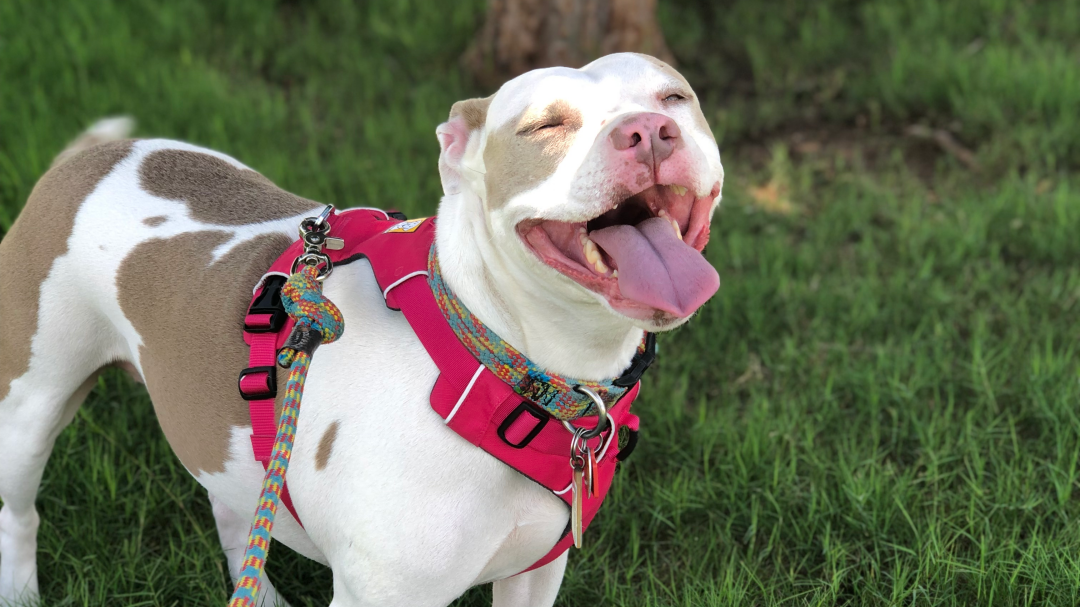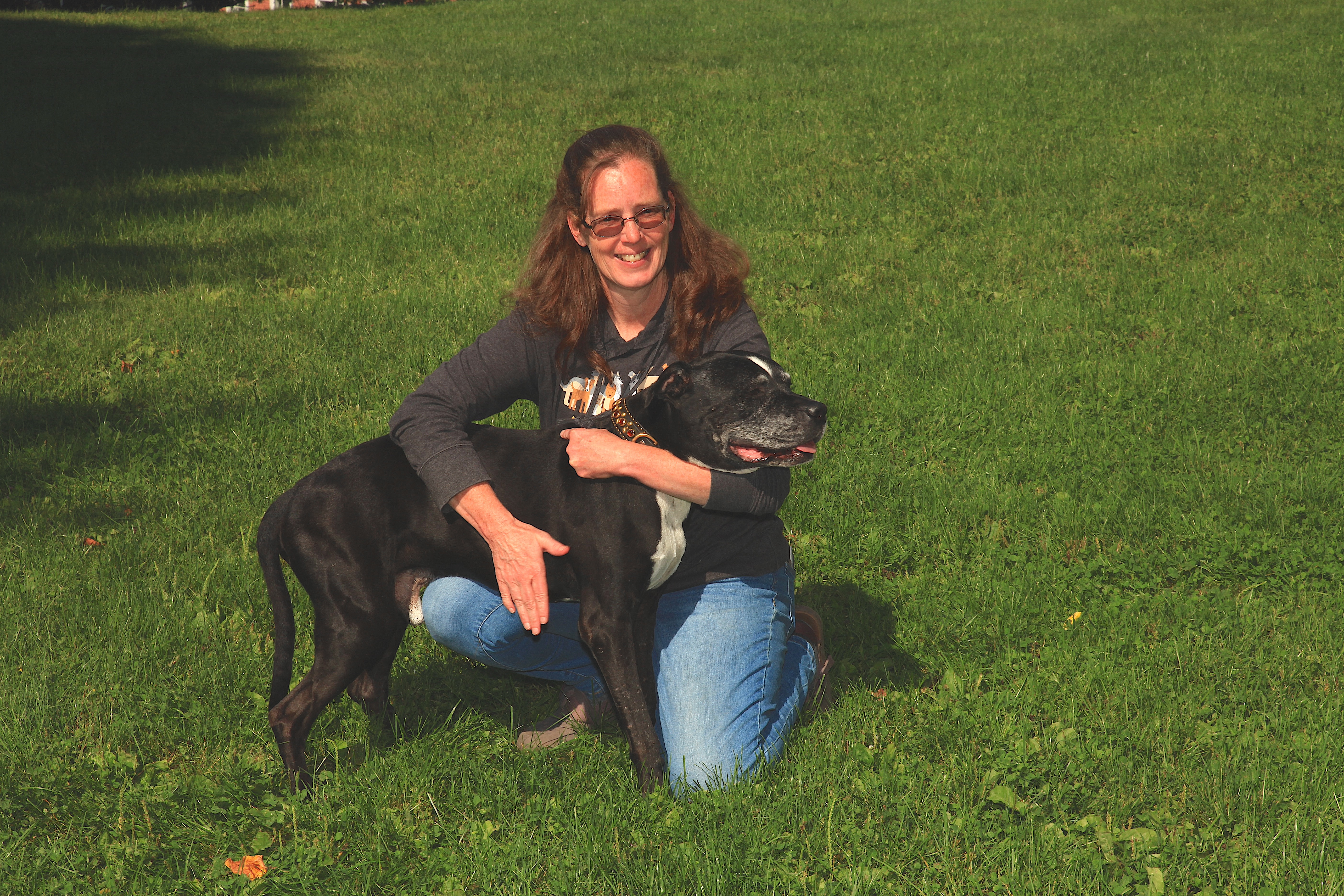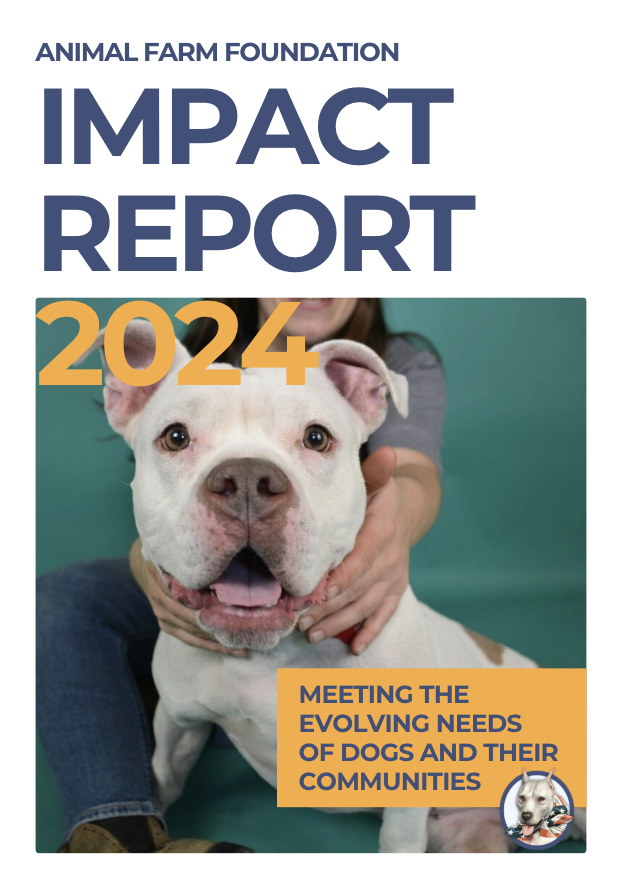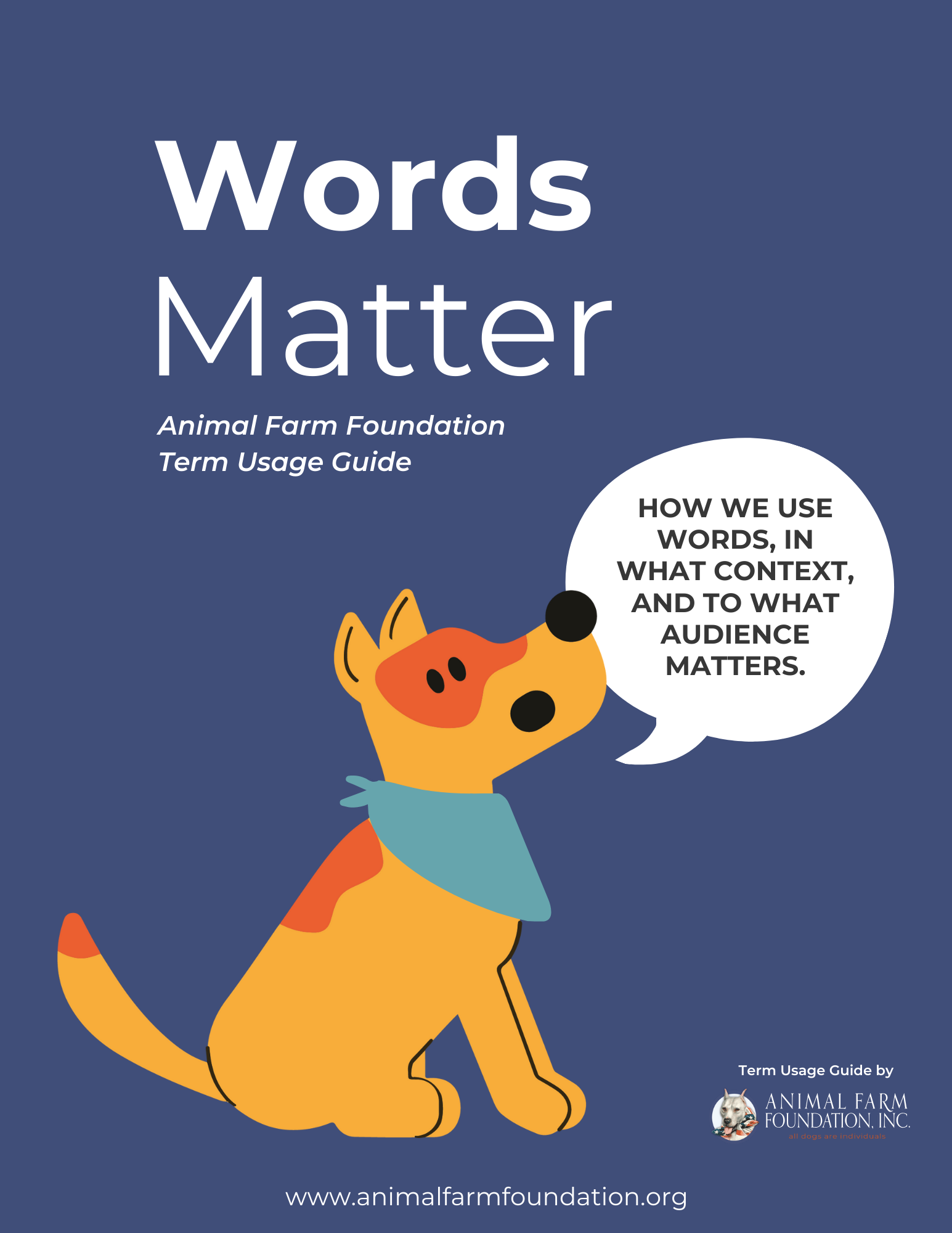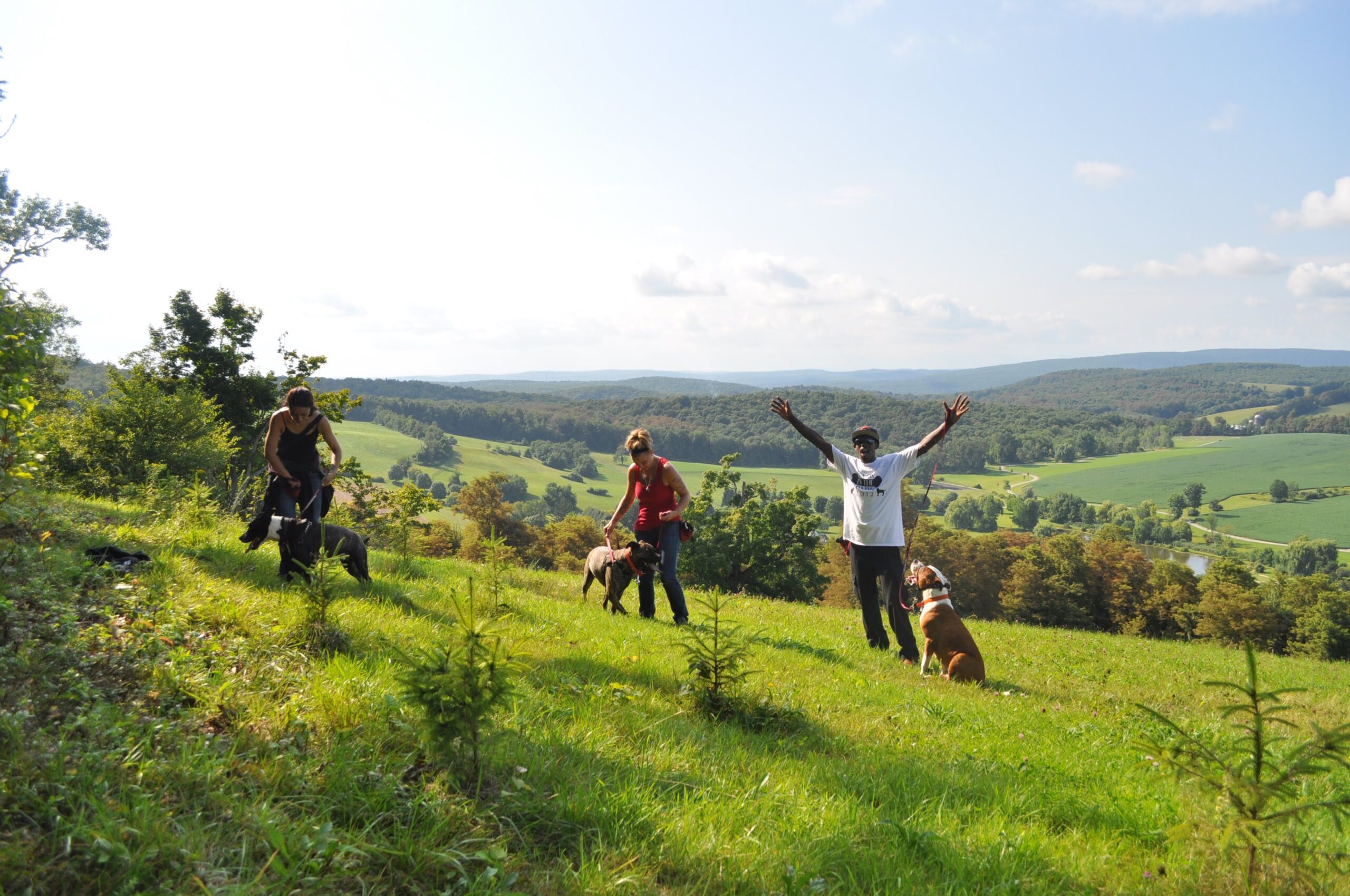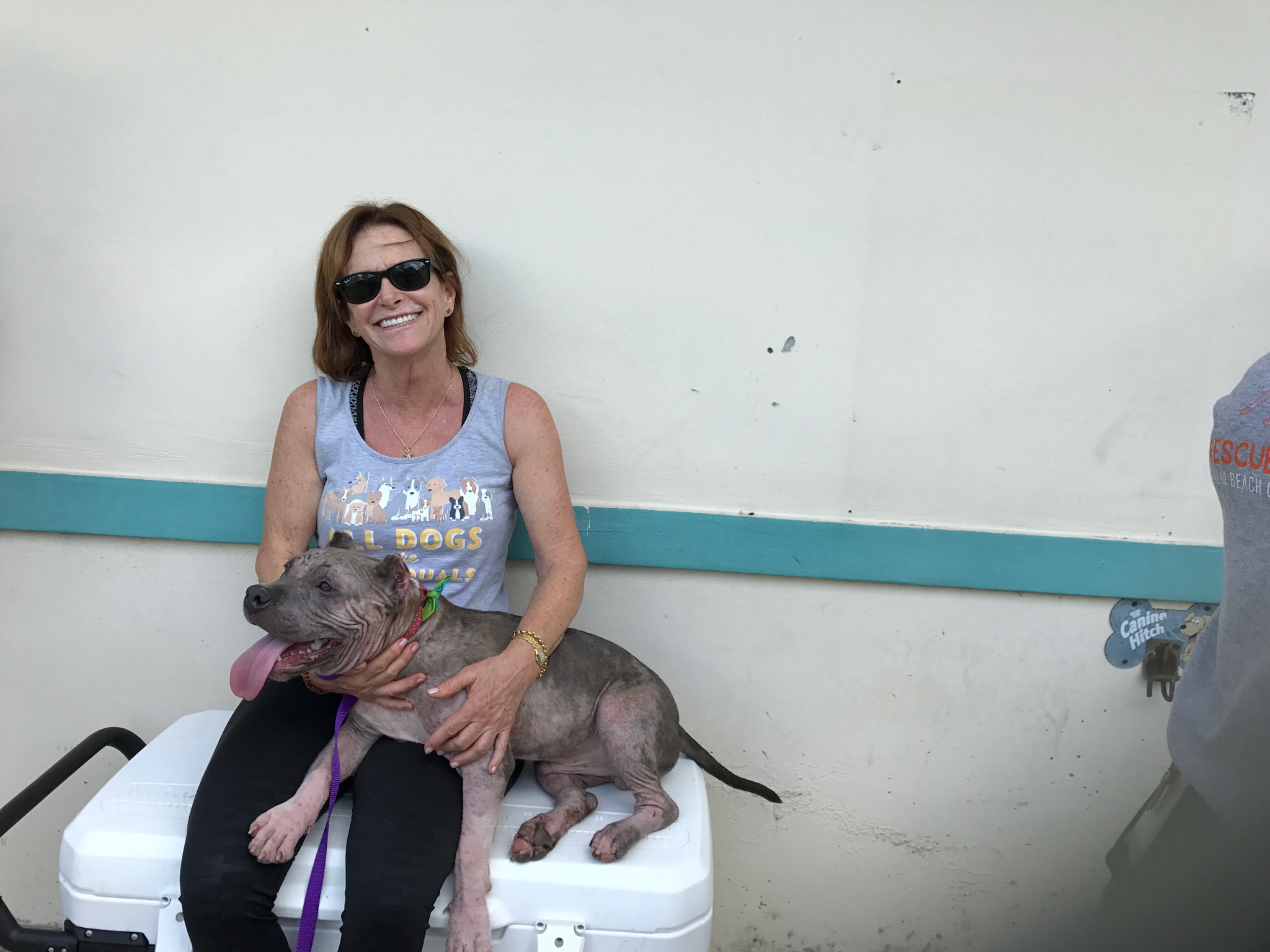For this episode of the Individual Animal, we spoke with Dr. Kelsea Brown from the National Canine Research Council. Kelsea recently relocated to Chicago and what she encountered while looking for housing surprised us.
First, she had some rules:
- Unless a place specifically said “no pets,” she applied, even if it said there were breed restrictions.
- She had her facts about canine science and behavior ready.
- She emphasized that she was a responsible dog owner and that she would continue to take responsibility for her pets.
Kelsea has two dogs and two cats, and her many people perceive her dogs to be “pit bull” dogs. But Kelsea and her husband have never had their dogs’ DNA tested. They just consider them dogs. They didn’t consider breed restrictions because they don’t know their dogs’ heritage and they don’t need to know that to know that they are great pets.
We can’t dismiss the fact that Kelsea’s experience comes from a place of privilege and we get into more of that in the podcast episode.
But there is something to be said for the action plan she had and the approach to working with others that she took – in fact, that last part is key. Kelsea said multiple times that she approached the process with the assumption that people are reasonable, so that if she reasonably explained the facts and explained that she was a responsible dog owner that her chances of getting an apartment she liked were pretty good.
The Individual Animal is available on iTunes, Stitcher, Spotify, Google Play, and wherever you listen to podcasts.
Listen to the episode to find out how it all turned out. And tune in next week where we dig deeper into this issue with Shannon Glenn from My Pit Bull Is Family, because while Kelsea’s advice will be helpful to some people, the reality is that far too many dogs and people are separated because of pet owner inaccessible housing.
Want to be on our podcast to talk about the intersection of animal welfare and social justice? Want to yell at us for our opinions? Email us!
Regina [00:00:00] Hi and welcome to the individual animal a podcast about dogs people and discrimination. I am Regina and that is Nikki.
Nikki [00:00:08] Hi guys. And today on our podcast we have Dr. Kelsea Brown. Kelsea why don’t you go ahead and introduce yourself and let people know a little bit about yourself and what you do.
Kelsea [00:00:19] Sure. Thank you guys for having me. I’m Dr. Kelsea Brown. I’m a research scientist with National Canine Research Council. I’ve studied canine behavior and welfare specifically for my dissertation. With that canine sociability and how we measure sociability in shelters specifically.
Nikki [00:00:37] What did you do for your dissertation to study them?
Kelsea [00:00:41] I looked at the ways that we measure sociability and dog. So it fell under the umbrella of behavior evaluations.
Kelsea [00:00:48] That was my approach to it because a lot has been done on the kind of more aversive side of behavior evaluations and trying to find which dogs are going to behave badly. But I was more interested in whether human factors or environmental factors are going to influence dog’s behavior. So I looked at how minor differences or changes in the way we approach behavior evaluations specifically the sociability aspect will affect your dog’s behavior.
Kelsea [00:01:18] And I found that things like a person’s posture or whether the dog was leashed…. Or what were some of the others….. I looked at posture…. Leashed… And the types of tests that are done because there’s many different approaches to looking at sociability. So I compared dogs behavior across all these different conditions and found that both the way the human approaches it and the way that the assessment is set up is going to influence dogs behavior.
Nikki [00:01:47] Did you study owned dogs or shelter dogs?
Kelsea [00:01:53] All the dogs in my studies were dogs living in the shelter. So the shelter that I worked at that I was doing research with, does not use behavior evaluations but it was still a setting where these might be done and are typically done across the country.
Nikki [00:02:07] So all that’s really interesting. We might need to have you on another podcast to talk about. The whole thing because I’m very intrigued right now but that’s not why we have Kelsea on today. We actually have her on to talk about housing issues. So we got an e-mail from our executive director the other day to let us know that Kelsea recently relocated with her animals, and we’re going to talk a little bit about her experience with that. So you recently relocated to Chicago.. First why don’t you tell us a little bit about the animals that you have because you know that’s really what everybody wants to know about anyway!
Kelsea [00:02:49] Sure. So I have four animals which made it a little bit tricky. I have two cats two dogs. One of the dogs is about 80 pounds. He’s got people on the street always saying he is a pit bull, but he is just a mixed breed dog that I got from a rescue.
Kelsea [00:03:06] I’ve never tested his DNA. I don’t know what breed he actually is or what maybe in there. My Other dog is looks nothing like him, but also gets called a pit bull. And she is about 40 pounds. I also got her from a rescue, so I don’t know what’s in her heritage either.
Kelsea [00:03:29] Previously when I was during my PhD, we were in West Texas and we owned a house. So we had no issues and no pet restrictions, breed restrictions, or anything like that. But then we when I finished my dissertation we moved to Chicago, where we are no.
Nikki [00:03:50] When you were living in your house in Texas did you ever have any issues with homeowners insurance?
Kelsea [00:03:59] At the very beginning it was actually… there Is the funny story with my husband trying to trying to get our insurance and the person on the phone… I don’t remember which company it was with… but they kept asking what breed of dog we have. My husband was so great again and again… “I don’t know I haven’t tested their DNA.” “OK well what do you think he is?” “I really don’t know. I got him from the shelter and he just he’s a great dog. He’s a big dog. He’s got short hair…” And again and again and went on for about 10 or 15 minutes of them just really trying to press for him to give a breed. And he just wouldn’t because he said I don’t know. And finally they said OK we’re putting down lab mix. So we did we did have housing insurance for them. And then I think eventually we switched State Farm and we didn’t have any issues there.
Nikki [00:04:55] Oh yeah. State Farm is great. They’re like one of the largest companies that does not have any breed restrictions so to give it. Give a shout out to State Farm. So what made you decide to move to Chicago.
Kelsea [00:05:13] Well we are really lucky in that we both work remotely and so we could choose anywhere and we kind of explored different areas in the US and landed on Chicago. It had everything that we were wanting. It’s got great baseball great weather that’s a fun thing to do. Vegetarian food… we’re happy.
Nikki [00:05:33] I’m guessing your husband is a baseball fan?
Kelsea [00:05:35] I’m also a baseball fan. Actually we love baseball so there’s tons of games that we can go to here. It’s just that it’s a different climate and in West Texas so we’re really enjoying being in the city.
Nikki [00:05:50] Yeah I was. I think I’ve been to Chicago once or twice and it’s I thought it was like the coolest city so beautiful they’re like really cool buildings and you know I did all like the touristy stuff.
Kelsea [00:06:02] I’m so new here. I’ve only been here for a little over a month and so it’s. Like, I’m a novice.
Nikki [00:06:10] Well it is definitely a really cool city at least I thought so when I was there.
Kelsea [00:06:14] The traffic is a little bit crazy but that’s the best part is you don’t when you’re in the city like this you don’t need the car though. We’re actually selling our car. I’ve never not had a car before but now it’s all about the public transit. We have really good public transit here and walking…
Regina [00:06:30] Well maybe I should move to Chicago.
Kelsea [00:06:31] You guys should come out. Come visit.
Nikki [00:06:31] I would love to. Regina, maybe we should come scout it out for you.
Regina [00:06:37] Yeah yeah but I don’t know it gets a little bit too cold. I don’t really want to move any further north. DC winters are enough for me. So let’s go back to talking about your housing.
Regina [00:06:50] So you have all of these animals which…. Send me pictures because people want to see them and I’ll put them in the blog and the show notes. So when when was the first moment that you realized you were going to have trouble moving with your dogs?
Kelsea [00:07:05] It’s something that was always in the back of our mind, because before Texas I was actually in California. That’s where I’m from originally and I lived in apartments my whole life. I was totally used to there being animal restrictions and I grew up with cats, so I didn’t really have a chance to have dogs growing up. When my husband and I started renting together, we were in a house that did not allow dogs and so that was a bummer.
Kelsea [00:07:32] And right before we moved to Texas our agreement was as soon as we buy a house we can get a dog. And so we went to Texas for an offer in on the house. And before we even got on the airplane to go back home I put in an application for a dog. We had a dog with us for the last three weeks that we were in California.
Kelsea [00:07:49] We just couldn’t wait. And even at that time it was something that we discussed like I guess this is going to be great for a while we own a house in Texas but then what? And it was kind of always, “well we’ll cross that bridge when we get there and try not to think about it too much.”
Kelsea [00:08:06] But as it was approaching that was definitely in our mind. When we were first looking at houses almost every place that’s renting had breed restrictions and some of them specify some of them don’t. But very very few had you know “all pets welcome.”
Nikki [00:08:24] So I did a quick read like a little bit of research before the call and was Googling like “apartments in Chicago,” “pet friendly or dog friendly rentals in Chicago” and I would look at listings that were categorized under pet friendly or dog friendly and it was like you would like I would be searching for dog friendly apartments and you would get down to the bottom it would say “cats OK. No dogs.” Or it would say “breed restrictions apply. Contact you the property management company for more details.” So it was like you searched for a dog friendly apartments and get what you were looking for and you almost had to go like an extra step in some way.
Kelsea [00:09:12] That was one thing that we encountered. So as we get into it I’ll tell you about how I ended up making strides with all the places that we applied except for one. There was a place that we were interested in. It’s actually down the street from us. We pass it every day now. We always shake our fist at it because the listing said dog friendly. And then when I called to make an appointment to come to the apartment the person said ask me about pets and I said Yes I have two dogs and she said “oh, we don’t accept dogs.” And I said “but the listing said…” and she said “well we have to say that because everyone around here says it”
Kelsea [00:09:46] That was a waste of everyone’s time. Yeah that was probably the most ridiculous thing that we experienced. With the others where our approach was, was as long as it said somewhere on there that they accepted pets we treated it as fair game. And so if it said breed restrictions, we just ignored that and said “we’ll deal with that when we get there.”
[00:10:10] What an awesome attitude to have. I like had chills. Like that’s such a great way to look at it. I don’t think most people that have dogs and breed restrictive list like they just automatically….. they’ll pass that up.
Regina [00:10:26] Yeah people get intimidated. And also I think some renters especially in this market when you know there is a housing crisis in most areas, people don’t realize that they can have negotiation power because there’s a lot more that goes into renting a place.
Kelsea [00:10:43] Right. So I recognize that I’m in a very fortunate position and that we didn’t have to move right away. We weren’t up against the clock. We were doing this at our own pace. Also given my background, I had you know some tools in my belt to help me navigate the conversations. I realize that you know not everyone is in that same situation. And I’m hoping that by talking about this people can realize that they do have those tools and that there is grounds there. And often the people on the other end are reasonable just humans.
Kelsea [00:11:15] And you know this is just part of the process when you’re putting something online for rent or there’s something that’s been written down from the past by just kind of get forwarded on and really they may not have the same opinions. A lot of people that I talked to were very reasonable and agreed with me.
Nikki [00:11:35] OK. So you are looking for how you were looking for apartments…
Kelsea [00:11:42] So we narrowed it down to in our filters where it had to be pet friendly. If there were places that said No dogs then we we did take those off of our list because we figured I don’t know maybe that they’re more serious about it than the breed restriction places. And so just kind of for our own sake of time and energy we we took those off the table. But as long as there was something that they allowed pets or there wasn’t something that said no pets, again that was considered fair game.
Kelsea [00:12:11] And another thing we found so many of them have pet limits. So almost all of them had to pet limit. And so again I just caught that and I we’ll talk about that if you know if this moves forward. And so that was kind of our starting point. We had a list of places that we were interested in contacted whoever the contact person was to schedule an appointment and whether it came up in that first call or not. And I just kind of left that up to them if they asked me on the phone or email if we had pets, then I would be very honest and say “Yes I have two dogs cats and two large dogs even and two cats.” And if they didn’t ask then I would just wait until in person meeting which can be a little bit easier to discuss and then just kind of took it from there and to the first meeting and waited until that discussion came up.
Nikki [00:13:03] Did you have any property management companies that were very persistent about what what your dogs what were their breed or were you denied certain complexes because of what your dogs looked like or like how did you handle that aspect of it.
Kelsea [00:13:19] So all of the places we ended up looking did have breed restrictions listed so the ones that we fell in love with there is maybe four or five on our short list that we went and saw and all of them said either “no aggressive breed” … That was one way that it was crazy. What does that mean? That was actually my favorite because I was like well that’s like an easy one to knock down! There’s no science there to back that. Doesn’t make any sense!
Kelsea [00:13:47] Some just didn’t specify and you said “breed restrictions inquire within.” And then the others were some of them specifically said no pit bulls. And I believe actually the place that we are now….. So the apartment that we chose and they did tell us no pit bulls are allowed. And so they never actually saw our dogs. So dogs were back in Texas. We didn’t bring them with us or anything. But right off the bat we told them people tend to call our dogs “pit bulls.” But let me tell you and I would kind of launch into my “pit bull is not a breed,” “breeds do not equal behavior….You can’t tell what a dog is just by looking at it” and just kind using all the tools that Animal Farm is really great about promoting….
[00:14:31] And just kinds of basic science that’s there. And initially it was kind of to do with the mouth open stare at me like what are we going to get to talk to me. And their eyes glaze over a little bit and it’s I’m sure you guys would take this all the time where the response is when I say like you know that breed is a social construct…… I get the idea. “I know I love pitbulls.”
[00:15:04] But so there is a lot of those circular conversations. And one of the things that I think helps us a lot, is, since we do have insurance, we would bring that up. Either we’d be happy to get renter’s insurance or something that would cover them or put them on one of our existing policies. whatever we could do to try to take that liability away from them, which that seems to be what their biggest concern was… that our dogs might bite someone in the apartment and that they would somehow be liable for that. And so it was by us saying “you know these are our dogs we’re responsible for them,” that seemed to be the key that really made them say OK yes whatever. And that after that the whole breed thing was kind of dropped.
Kelsea [00:15:54] The other thing was just as we were talking to them, you know if I said that these are humans, they’re understanding…. And I tell them, “I have really friendly dogs. They’re great. And they get along with other dogs. They get along with people they’re they’re fantastic animals” and show them pictures. And they go “oh they’re so cute” and kind of get them to see them as individuals rather than “oh this person is bringing in this aggressive restricted breed.”
Regina [00:16:21] Did you experience pushback? I mean did some people when you talk to them were they just not going for it?
Kelsea [00:16:26] For this particular apartment, this was the only one where there was just a little bit and I think it was because I was working with an intermediary. So I wasn’t actually talking to the building owner or landlord. They were using a third party. And so the third party clearly was you know they didn’t want to have to involve the landlord but because you know their job. They’re supposed to be making this easy for them. So there was a little bit like “well they don’t accept it but I’ll see what I can do.” And just a little bit of pushback there but you can kind of tell from his tone like he really wanting to go forward like we’ll so put in the application and and you know I think it’s going to be a problem.
Kelsea [00:17:09] And so it was a lot of like hedging but ultimately I was actually really surprised by how little pushback overall that I got. And so I was really glad that I took the approach of as long as they accept dogs I’m just going to go for it, because once it got down to me being in the apartment, looking around, them seeing that I’m actually interested in it, them knowing that I meet whatever their requirements are for the application besides the dog part, that they were really really willing to to kind of let that slide or to not let that be a barrier which I was I wasn’t fully expecting. I thought that I would get a lot more pushback.
Nikki [00:17:46] I’m very surprised. And I just like this thought just popped into my head. So it might be out of touch but I wonder if some landlords are bringing these breed restrictions as like a combat to make sure, because of their preconceived notions, trying to not have irresponsible dog owners in their complex. So it sounds like like once they realized that you guys are responsible dog owners it didn’t matter what your dogs looked like. Nothing mattered at that point about what your dog looks like or is labeled or anything like that. So I’m not saying it’s OK for them to do that but I like I wonder if that’s part of their you know their screening process.
[00:18:36] Yeah yeah. That could be… because I definitely did emphasize you know like “these dogs are great. We go for walks all the time. They walk so nicely on the on a leash and harness.” And I’m trying to build that picture of life. These great dogs that are part of our family, which is what the case is and they were pretty receptive to that. And again just saying that we were happy to take responsibility to put them on our insurance or to make sure that they were included under our liability or we were the ones that were responsible for them. They seemed to also acquiesce that made them feel a lot better about the situation.
Regina [00:19:15] I think that’s the advice to give to people really. Yes you talked about how how great your dogs are, but it sounds like you talked more about what great dog owners you are. Everybody loves their dog and wants to talk about how great their dog is, how sweet their dog is and that can.. You know people can just tune that out because everybody’s going to say that about their dog.
Regina [00:19:39] But when you talk about how you’ve got your dogs to walk well on a leash and you know you take responsibility for them and all that. I think that is probably what resonated with those property managers.
Nikki [00:19:52] They’re more concerned about the money. Aspect of anything so I’m sure that in being able to offer up having insurance played a big part in it because that’s what I mean. Essentially I’m guessing that’s their concern as the dog is gonna bite somebody the dog’s going to tear up the apartment you know. So that’s what the pet deposit is going to cover or the insurance is going to cover. So once their pockets are you know safe.
Kelsea [00:20:17] That’s so funny because it’s my cats that are actually going to do the damage!
Nikki [00:20:25] And you know I’m more of a dog person than a cat person. Don’t throw eggs at me all the cat people…. But I’ve had cats and then like I’ve had cats that have been neutered and still spray everywhere and on everything. So it really it just depends I always you know and usually you see like cat deposits are cheaper than dog deposits. And big dog deposits are more expensive than small dog deposits. I mean we know as you know people that work in the animal industry that like sometimes cats can be more destructive, sometimes big dogs can be more destructive, sometimes small dogs can be more destructive.
Kelsea [00:21:16] One thing that you just reminded me when you said deposits and I didn’t mention is that one approach we took as we offered a higher deposit and no one took us up on it. Actually, in Chicago we have a weird thing – I don’t know if it’s Chicago specific or Illinois specific, but there is this weird thing where the apartment places don’t want to take deposits because they have to be responsible for like paying the interest on it. If you know when you move out and there’s I guess there’s like room for them to make mistakes there. And so they choose not to do deposits. None of the places that we applied to wanted a deposit.
Nikki [00:21:56] Even a regular deposit, not just a pet deposit?
Kelsea [00:22:00] Even a regular deposit. And so at least the places that we are looking at, they all had a moving fee which was significantly lower than what most deposits are. I don’t remember the exact amount but it was… I remember being like, “that’s not a deposit!” But it was just a one time move-in fee and that’s non-refundable. And so any offers of, “we’d be happy to pay a bigger deposit if that will you know help reassure any concerns that you have or make you feel better about the situation…” every single place said “No no we don’t need a bigger deposit.”.
Nikki [00:22:39] Did you have to pay…. because usually pet deposits are non-refundable. Did you have to deposit where you are now.
Kelsea [00:22:47] We did not have to pay an extra deposit. We do have pet rent and one of the things that was really nice is because they had a per-pet rent and because we had so many… Without us asking, hey actually said “we can work with you on that we can cut it in half since you have four instead of two.” They were really nice then and cut our pet rent in half from what it would be based on what they had you know on the on the lease originally.
Nikki [00:23:12] So on paper this complex, it sounds like because you said this is the one that said specifically no pit bull dog… Right?
Kelsea [00:23:19] Right.
Nikki [00:23:20] Yeah. So like on paper this facility, and I don’t know if it’s a complex or condo where you live, but looked very, to a dog owner, unappealing. For me personally I would have probably looked at that if I was in search of apartments and been like, “I’m not even gonna waste my time with these people.” (If I didn’t work in the you know the job that I did and didn’t want to you know advocate) but that’s… I mean that’s pretty crazy. So you are now living in a place, you have less of a pet rent than you should be. People were so nice to work with you. You have your dogs that are like not considered by you but maybe considered by others as you know that people look or label whatever you want to call in a complex that had breed restrictions.
Kelsea [00:24:12] Yes and it’s completely legal. I didn’t lie or anything. I just was honest from the get go that I’ve got these two great dogs. Some people call them pit bulls I don’t call them pit bulls. And then of course launched into my national canine research I put my cap on and then told them all about what the term is and visual breed identification and everything. And I don’t know the door just seemed to open right up. It wasn’t…. There was not that pushback there that I had anticipated and so and I again I recognized the fortunate position that I’m in. So I don’t imagine that every single person is going to be as lucky as I am given my background and my kind of willingness to fight for it, and the kind of confidence that I had in what I was telling them. As well as, again, the time constraints. We weren’t worried about… You know it wasn’t like we had to be out of our current place in two weeks and we had it for a desperate to find the place it was and we’re on our own time. And then finally one thing that I’ve kind of been wondering since that’s happened is whether this experience would be true across income brackets.
Regina [00:25:25] That’s what I was going to bring that up. Income brackets and you know different cultures and all that I think your experience is probably very singular to income level and race. I mean no not not everybody is an asshole though right. So not everybody is going to treat people differently. But you know based on what we’ve seen and from talking to the people that we’ve talked to who help pet owners with housing, it’s very much divided on racial and income lines.
Kelsea [00:26:01] Yeah exactly. And I that’s one of the things that’s kind of been gnawing at me because I had this this initial experience like wow this is wonderful it’s so easy. And then as I as I sit there and think about it I’m like well I had quite a few advantages that were helping me including race income bracket and the language she used to to discuss my knowledge of the situation. You know I had I had those those advantages and the tools to really truly help me. And so I recognized that privilege and I hope maybe I’ll start putting this out there that other people can use some of those same tools of talking about this: “there is no such thing as an aggressive breed” or “that we can’t tell what the dog was by looking at it” or that “I don’t know the dog’s breed I haven’t had a DNA tested” or talking about their own you know responsible pet ownership and that maybe some of those things can help bolster their approach to finding pet friendly apartment.
Regina [00:27:01] I think the tools are really important because and like you say you know you had the confidence to do this but it is really important when you do something like this to have the confidence to have the tools to know what you’re going to say and to have an action plan. And I think from what I’ve heard from a lot of people they do get intimidated and because that’s that’s their family their dog is their family and so it immediately kind of feel offended. And so then aren’t able to be objective and go at it from an objective perspective and that’s that’s what you need to do and that’s what you did. And that probably helped to a lot.
Nikki [00:27:35] I agree. And I think the majority of our listeners are probably people that work in sheltering. So I think this is really just good for them to be able to share with the people that come in that are you know that are possibly maybe looking for their dog because they don’t have a place to live that’s going to allow them to have their dog… to help them understand that maybe their pool is larger than they thought it was. So I think that’s going to be a really helpful tool for shelters to have too. I mean, like you said, this is a very particular instance. But I think…. you’ve changed my opinion and I will say that like I I would have never even bothered with breed restriction.
Kelsea [00:28:19] It’s an interesting empirical question right. We could pretend that we’re interested in living different places having a call around and express interest in Hey by the way I had a feeling that the response was.
Nikki [00:28:40] it would be a really good research project to do, I think.
[00:28:47] I hope it’s the case that this wasn’t you know just one isolated experience that I had and that across the board that there are these things that have been put on paper and that are maybe unfairly used as a screen. But at the end of the day you know when you talk to the people and get their end of the paper when you kind of present your specific case and and your situation but I hope that it’s the case that people are generally as reasonable as they were in my experience.
Nikki [00:29:18] Were you approved for other other apartments at had breed restrictions or was it just the specific one that you kind of went after?
Kelsea [00:29:27] No. Actually all of them did and there is like I said four or five all of them were fine with going forward with the application and agreed to allow them. I was very fortunate except for that one place again that just said No dogs even though had dogs listed. This gorgeous place on the end of our block and we walk our dogs past it every day….
Nikki [00:29:58] Do you have like other is there like a lot of dogs in here in your apartment?
Kelsea [00:30:05] There is only one other dog. Yeah. So it’s a small unit and so of the six there’s two of us to have animals. Then the neighborhood itself is full of dogs. Every time we go outside we see 10 or 15 dogs.
Regina [00:30:18] All right well thank you. Thank you for sharing this experience with us and I hope that it does motivate some people to just stand up for themselves to stand up for their dogs and to share factual information before they decide they don’t even want to try… That it’s worth trying. It’s worth the ask and it’s it’s worth presenting people with facts.
Kelsea [00:30:39] Yes. And for the place for the one place that did outright reject us that was no dogs. I mean it it was a waste of time but it was at the end of the day it was five minutes.
Nikki [00:30:50] You know they’re losing a really good renters. People that have pets, they find an apartment that allows all their pets they stay forever because it’s so hard to find accessible housing. So good luck to them.
Kelsea [00:31:05] Thank you very much. I really appreciate you giving me the opportunity to talk about the experience and hopefully help others out there that might find themselves in a similar situation.
Regina [00:31:15] Yeah and we’d love to have you back to talk about behavior evaluations also. So while we’re still working on our future schedule. But that would be really good.
Kelsea [00:31:24] So you know where to find me.

